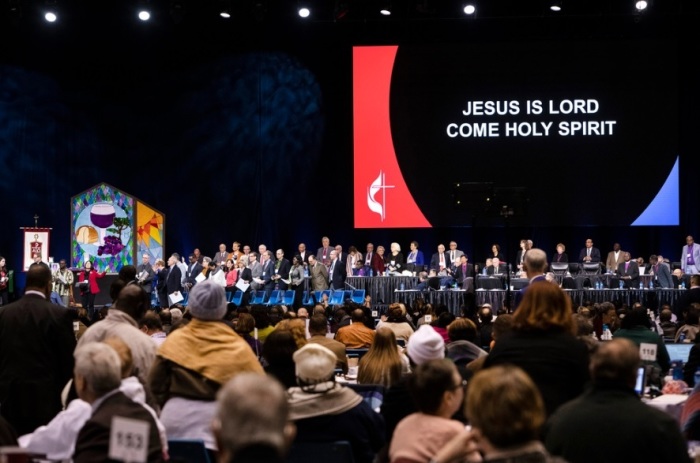UMC high court partially upholds ‘Traditional Plan’ on LGBT issues

The United Methodist Church’s highest court has partially upheld a measure passed by a special session of General Conference that would provide stricter enforcement of the denomination’s rules against homosexuality and gay marriage.
In a decision made public on Friday, the United Methodist Judicial Council ruled that the “Traditional Plan” approved earlier this year at the special session has parts that violate the denomination’s constitution.
Known as Judicial Council Decision 1378, the ruling refused to strike down the entire Traditional Plan, noting that the petitions within it that were unconstitutional “can be severed from the remainder.”
“These petitions are not so closely related that a change in one affects the others. The petitions held unconstitutional have no effect on the petitions declared constitutional,” read the decision. “The constitutional petitions are not dependent on the unconstitutional petitions and can survive without the unconstitutional petitions.”
Petitions declared constitutional included, among others, Petition 90032, which offered a fuller definition of the term “self-avowed practicing homosexual” in the Book of Discipline; Petition 90036, which stops bishops from consecrating noncelibate homosexuals as bishops, even if they were elected by a conference; Petition 90042, which mandates a year’s suspension without pay for any pastor who officiates a same-sex wedding; Petition 90043, which bars the approval or recommendation of a person for ordination if they fail to meet the standards, including that of being in a same-sex relationship.
In another ruling, the Judicial Council upheld a petition passed at special session that would allow an easier departure for congregations that want to leave the denomination.
In Judicial Council Decision 1379, the church court ruled that Petition 90066 passed the three minimal requirements, specifically: “the disaffiliation resolution be approved by a two-thirds majority of the professing members of the local church present and voting at the church conference,” ... “the terms and conditions, including effective date, of the agreement between the annual conference and the exiting local church be established by the conference board of trustees in accordance with applicable church law and civil laws,” and that “the disaffiliation agreement be ratified by a simple majority of the members of the annual conference present and voting.”
“When taken together with the consent of the annual conference pursuant to ¶ 2529.1(b)(3), Petition 90066 as amended meets all three requirements and is constitutional and provides a means for the disaffiliation of a local church,” concluded the Judicial Council.
For the past several years, the UMC has been involved in a divisive internal debate over whether the denomination should change its position on LGBT issues.
In February, the global denomination held a multiday special session of General Conference in St. Louis, Missouri, to try and develop a resolution to the debate.
On Feb. 26, delegates voted 438-384 in favor of adopting the Traditional Plan, which involved maintaining the UMC’s official position against homosexuality, same-sex marriage, and the ordination of noncelibate homosexuals while promising stricter enforcement.
Also approved was a measure to make it easier for congregations that oppose the denomination’s stance on LGBT issues to leave with their property and funds.
Delegates from overseas, especially Africa, Southeast Asia, and Eastern Europe, were a key factor in passing the Traditional Plan.
Reconciling Ministries Network, an advocacy group that sought to change the UMC’s position on LGBT issues, denounced the Traditional Plan as “deeply unjust and painful.”
“The Traditionalist Plan was passed by the efforts of organized opponents to gospel inclusion who have funded and promoted the demise of Christian witness across denominations who have dared to call out a white nationalist strain of Christianity,” stated RMN.
The Rev. Thomas Lambrecht of the theologically conservative Good News magazine celebrated the result, stating that the UMC “sent a clear message that we will maintain traditional biblical moral standards on marriage and human sexuality.”
“We will not forsake Scripture as our primary authority. We will remain united with our global United Methodist brothers and sisters with shared common ethics,” stated Lambrecht.
In response to the vote, the Judicial Council held a meeting in in Evanston, Illinois, on April 23-26 to hear two challenges to the approved measures from the special session.
The first was from Pastor Timothy Bruster of the Central Texas Annual Conference, who requested the church court review the “constitutionality, meaning, application, and effect of the adopted legislation referred to as the Traditional Plan.”
The second was from the UMC Council of Bishops, which submitted a request for the Judicial Council to determine the constitutionality of Petition 90066, which allowed congregations an easier process for being dismissed from the denomination.
The petitions of the Traditional Plan that were declared constitutional by the Judicial Council this week will take effect in the United States on the first day of 2020 while taking effect overseas 12 months after the UMC General Conference in May 2020, according to United Methodist News Service.



























